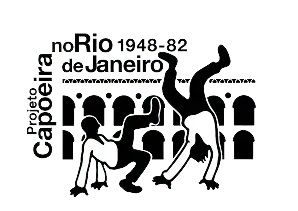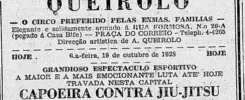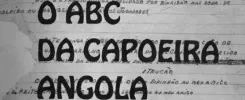By Coletivo CapoeiraGens
The awarding of honorary doctorates is a long-standing tradition at universities around the world. What is new is to grant it to a capoeira master. The awarding of honorary doctorates to masters Bimba (posthumously), João Grande, João Pequeno and other outstanding masters by universities with respected doctoral programmes in Brazil and abroad helps not only to pay tribute to those masters, but also to show that the fundamentals of capoeira should be recognised as part of the cultural heritage of humanity.
It is worth clarifying how the process of awarding this honour in Brazilian universities takes place, and what the value of the title is. To return to the example of the three prominent mestres, one of them – Mestre João Grande – received the honour in the United States, a process initiated by North American students and academics, specialists in Black Diaspora culture.
In Mestre Bimba’s case, it was also one of his students, Prof. Hélio Campos (Mestre Xaréu), who initiated the process at the Federal University of Bahia. He himself holds a doctorate in Education obtained at the institution and is the author of works relevant to capoeira, including the book Capoeira na Universidade: uma trajetória de resistência. The proposal to award the title was approved by the board of the Faculty and then submitted to the highest body of the University. As a result of the approval of the proposal, Mestre Bimba was awarded, posthumously, the title of Doctor honoris causa, on June 12, 1996, in recognition of the important service he rendered to capoeira by creating a teaching didactic and a modern style, today known as Capoeira Regional.
The master is the one who is recognized by his community as the holder of a knowledge that embodies the struggles and sufferings, joys and celebrations, defeats and victories, pride and heroism of past generations, and has the quasi-religious mission of making this knowledge available to those who resort to him. The master thus embodies the ancestry and the history of his people and for this reason assumes the function of the poet who, through his song, is capable of restoring this past, as an establishing force that bursts forth to dignify the present and to lead to constructive action in the future. […] The awarding of the title of Doctor “Honoris Causa” to Master João Pequeno arises from the understanding that the university – which is the highest representative of scientific knowledge – urgently needs to give dignity and recognise popular knowledge as fundamental for a greater humanisation of the world.”
The YouTube channel of the Federal University of Pernambuco (UFPE) displays the video of the ceremony that awarded the title of Doctor Honoris Causa to Mestre Pirajá.
At the ceremony, Rector Alfredo Gomes declared that “the university tries to update itself in the search for relevant knowledge that generates an impact on the lives of the populations and that [Mestre] Pirajá is a historical reference in Brazilian capoeira and the institution is very proud of the award of the title .”
It is important to stress that these degrees are only honorary, they have no formal value in the academic world, nor in the wider job market. They do not correspond to a doctorate, which is a requirement for a career in academia and related areas. Its value lies in the prestige it confers on the recipient, this reputation being greater or lesser according to the standing of the institution that conferred it. An honorary doctorate degree granted by a renowned university confers much prestige, but the same degree granted by an institution without any distinction in academia is practically worthless.
It should be remembered that Brazilian law does not recognise honorary doctorate degrees. In Brazil, education at all levels is governed by a Federal Law, Law No. 9.394, of 20 December 1996, known as the Law of Directives and Bases of Education (LDB). And the LDB does not mention, in any of its 92 articles, the expression honoris causa. Thus, in theory, any institution in Brazil may grant an honor or distinction called doctor honoris causa because the Brazilian legislation and the Ministry of Education do not regulate and do not recognise this title. It is, therefore, an honor that does not generate rights to the recipient nor does it qualify him for any other professional exercise, besides the qualifications he already holds.
References:
Abib, Pedro. “Discurso de Saudação – entrega do título de Doutor Honoris Causa para mestre João Pequeno de Pastinha”. Salão Nobre da Reitoria da UFBA, 23 de abril de 2008, ms.
Campos, Hélio (M. Xaréu). Capoeira Regional: a escola de Mestre Bimba. Salvador : EDUFBA, 2009.
Castro, Maurício Barros de. Na roda do mundo: Mestre João Grande entre a Bahia e Nova York. Tese de doutorado em História, USP, 2007.
LDB : Lei de diretrizes e bases da educação nacional. – Brasília : Senado Federal, Coordenação de Edições Técnicas, 2017.
https://www2.senado.leg.br/bdsf/bitstream/handle/id/529732/lei_de_diretrizes_e_bases_1ed.pdf
“UFBA homenageia João Pequeno, mestre de capoeira e doutor honoris causa”. https://www.ufba.br/ufba_em_pauta/ufba-homenageia-joão-pequeno-mestre-de-capoeira-e-doutor-honoris-causa
Coletivo CapoeiraGens is a collective of capoeira mestres and researchers.






